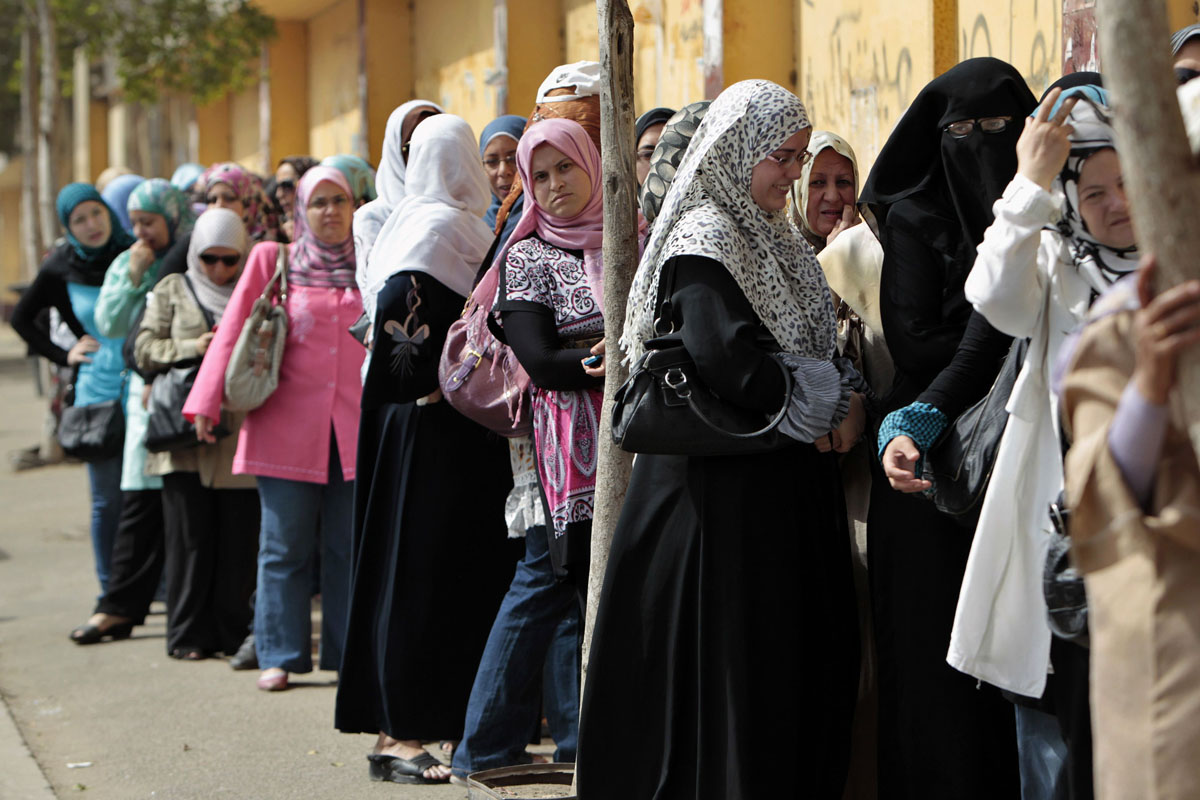"An entire book" could be written about the experiences of female travelers in Egypt, according to Lonely Planet.
"Most of the incidents are nonthreatening nuisances, like a fly buzzing in your ear: you can swat it away and keep it at a distance, but it's always out there buzzing around," its 2010 edition Egypt guidebook says.
The fly, as Lonely Planet calls it, is sexual harassment in Cairo's public spaces, and in recent years, it's been recognized as a widespread problem. Discussions about sexual harassment – in Egypt or elsewhere – often question whether a woman's appearance provokes her harasser.
Take the movie "Cairo Time," which tells a story of unexpected love between an Egyptian man and an American woman. In one scene Juliette, played by Patricia Clarkson, navigates the streets of Cairo – her appearance, particularly her blond hair, attracts stares from young men. Because she's middle-aged, Juliette thinks she's imagining the harassment. But her love, Tareq, is not surprised: "You are beautiful woman," he tells her.
A problem for all women
For many foreign women living or traveling in Cairo, Tareq’s words fail to provide an adequate explanation.
"I think the first thing that you see when you move here and when you live here is that the harassment is all the time, and that you never know where you're going to be when something bad will happen," said Catherine Manfre, a 24-year-old who works in Cairo.
There's not much research available on sexual harassment in Cairo, but what research has been done suggests the vast majority of all women in Egypt experience harassment. Most news reports rely on one survey, conducted by the Egyptian Center for Women's Rights (ECWR), in 2008. It found that 83 percent of Egyptian and 98 percent of foreign women experienced harassment – many of them on a daily basis. Further, the survey showed that most harassed women had been veiled at the time, and 62 percent of men surveyed admitted harassing women. Rasha Hassan, who worked on the study as a researcher, said the results would be slightly different if the same study was conducted today.
“When we were working on our field study, people didn’t know what sexual harassment meant, and they thought it meant sexual assault,” Hassan said. Now, people are more aware about the concept, she said.
Rebecca Chiao, who founded the organization HarassMap, said she believed harassment rates for Egyptian women are actually closer to those for foreign women than the ECWR survey found.
"My personal opinion is that even though the statistics for foreigners are higher, and it's true we do stick out more, the difference is mostly because when the survey was done, it was not very acceptable for Egyptian women to just come and tell someone that they experience harassment," Chiao said.
However, Egyptian women and foreign women might experience harassment differently.
Nana Elhariry, a 21-year-old Egyptian Ain Shams University graduate, said she thinks women are targeted just because they’re women. She and her friend Amira Nagati, also 21, said they are harassed in the streets with stares, hissing and comments. They experience men approaching them to tell them “exactly what they want to do to them” in Arabic, something that might be different from comments non-Egyptian women receive. Nagati guessed that African women in particular might experience different kinds of harassment due to stereotypes.
Pinpointing the cause and coping
Discussions among foreign expats living in Cairo often centered around whether one’s hair color or “Western” clothing affects harassment.
Samer Ali, an Arab studies professor at the University of Texas, moderates the email listserve Cairo Scholars, which is popular among expats living in Egypt. He said the issue has been widely discussed on the list at least once or twice per year since he founded it in 2005.
"The harassment discussions are one of the best uses of the listserve," Ali said.
He said that while some foreigners used to blame the problem on Egyptian culture or Islam, the discussions he’s seen have become more understanding and analytical.
Manfre said she guessed that foreigners in all places with homogeneous populations stand out.
"I think foreign women do get targeted more just because they stand out more, and men do think they might be more receptive to this kind of stuff," Manfre said. "But it's definitely not just because you're foreign – I think it's because you are a woman."
She said when you hear about harassment, it sounds bad, but it’s not the same as experiencing it.
“You get to this point where you get really, really angry,” Manfre said. “When you have to go through it every day, it really starts to wear down your self-esteem and your perception of yourself.”
Over the coming weeks, Al-Masry Al-Youm each Wednesday will feature pieces that dissect the reasons behind sexual harassment, the coping mechanisms for women (and men) in the streets of Cairo and the system that has been set up to tackle this festering issue. Comments and input are appreciated – send us your stories of sexual harassment and information on any organizations or initiatives that combat sexual harassment in Egypt.
Contact the Life & Style section at nevineelshabrawy@almasry-alyoum.com for your input in The Sexual Harassment File.




